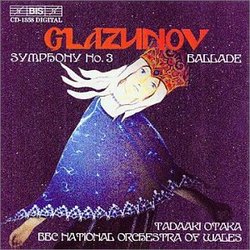| All Artists: Glazunov, Otaka, BBC Nat'l Orch of Wales Title: Ballade F Major / Symphony 3 D Major Members Wishing: 0 Total Copies: 0 Label: Bis Release Date: 1/28/2003 Album Type: Import Genre: Classical Style: Symphonies Number of Discs: 1 SwapaCD Credits: 1 UPC: 675754567026 |
Search - Glazunov, Otaka, BBC Nat'l Orch of Wales :: Ballade F Major / Symphony 3 D Major
 | Glazunov, Otaka, BBC Nat'l Orch of Wales Ballade F Major / Symphony 3 D Major Genre: Classical |
Larger Image |
CD Details |
CD ReviewsGreat Glazunov! Joshua Grasso | Oxford, OH USA | 09/24/2005 (5 out of 5 stars) "I'm glad that orchestras--if only in the world of recordings--finally re-discovered Glazunov's music. Sadly, I've never heard anything of his in the concert hall, though I'm now the proud owner of multiple copies of his complete symphonies, concertos, chamber music, and various orchestral works. Though not to everyone's taste, Glazunov is undeniably a master of the generation between Tchaikovsky/Rimsky-Korsakov and Rachmaninov/Prokofiev. His orchestration is masterly, his melodies are extremely memorable, and his symphonic voice is umistakably his own. Though not all of his music is inspired in the way of Tchaikovsky, Rimsky, or Borodin, all of it is worth listening to, particularly his magnificent set of eight symphonies. One of the best works to start with is the Third, as magnificently conducted by Otaka with the BBCNOW. It's the best reading I've heard on record, and consistenly directs you to the ravishing melodies and clever twists and turns of Glazunov's orchestral imagination.
The Third is not considered by critics his best, though it has everything you expect in a first-rate Romantic Russian symphony, and consierably more. The symphony opens with a background of pulsating winds supporting a lazy, yet yearning theme on strings. Glazunov soon gets this theme underway, leading to a extremely colorful development, by turns dramatic, pastoral, and coyly romantic. It may not be a flawless symphonic argument, but it's extremely inspired and only gets better with age. The highlight of the symphony is probably the quicksilver scherzo, which romps and bounces in a way that no other Russian composer quite managed; Borodin could never be so fleet-footed, and even Tchaikovsky lacked Glazunov's gossamer lightness. Everything stops for a tender, pastoral trio which reveals Glazunov's melodic inspiration with even the simplest material. The slow movement is long and expansive, growing out of a sighing phrase that grows to impressive heights. This is a gorgeous piece--easily leading the way for Rachmaninov's famous adagio from the Second Symphony. Listen for the great climax of this movement, a moment that gives the lie to the stereotype that Glazunov was a somber, unemotional "Western" composer. This is as profoundly Russian as it gets, albeit in an artistocratic, mid-19th century way. Speaking of which, the polonaise-ish melody of the finale echoes the sound world of Borodin, offering coloring and inventive variations on his famous predecessor. The disc also offers Glazunov's later Ballade, which is a typically colorful romantic piece--a bit brooding at first, but later bright and climactic. All this is beautifuly played by the BBC National Orchestra of Wales, which makes Glazunov sound like the master he is. Other fine versions of the 3rd are by Jarvi with the Bamberg SO, and Anissimov, with the Moscow SO. Both are quite good, the Anissimov particularly valuable for the price and the addition of the torso of the unfinished 9th, but Otaka's version takes pride of place." |
